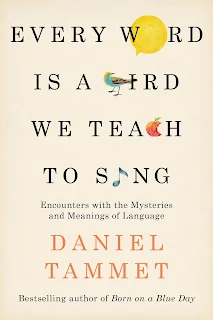 * Copy courtesy of Hachette Australia *
* Copy courtesy of Hachette Australia *Every Word Is A Bird We Teach To Sing - Encounters with the Mysteries and Meanings of Language is a collection of essays by Daniel Tammet. Daniel is an autistic savant with synaesthesia and his love of language and words intrigued me enough to pick up this book and find out more.
What I learned quickly was that Daniel Tammet is a little out of my league. His collection of essays takes an almost academic look at language and meaning, and I wasn't prepared for just how many languages he would reference; narrowly thinking this book would be primarily about the English language. I later learned Tammet is a polyglot and has mastered 10 languages: English, Finnish, French, German, Lithuanian, Esperanto, Spanish, Romanian, Icelandic, and Welsh, the majority of which are referred to in this book.
Most interesting essays
An Englishman at L'Academie Francaise was about the group of people assigned the task of refining the French dictionary. This felt like a glimpse into another century, so to discover this is still happening today was a thrill.
My favourite essay was Talking Hands, which was essentially about ASL. I didn't know that the persons's stance - leaning forward, leaning back or to the left/right - also added meaning to sign language and I just loved this essay.
I enjoyed A Grammar of the Telephone, which was all about how the emerging technology of the time inspired a new way for people to begin a conversation and talk to each other without the cues of body language.
Least enjoyable essays
Translating Faithfully was about translating the Old Testament and Conversational Human looked at whether chatbots will ever sound truly like 'us'.
Most impressive essay
OuLiPo is the essay title, but also a "loose gathering of (mainly) French-speaking writers and mathematicians who seek to create works using constrained writing techniques." (Wikipedia) While writing about these writers, Tammet does so without ever using the letter 'e'. It was amusing and easily the most impressive piece of writing in the collection.
I recommend this book to those with an interest in linguistics. Those with a love of the English language might find themselves a little out of their depth in some of the essays but there's no reason why you can't pick and choose which essays to read. It will be well worth the effort.
My rating = ***
Carpe Librum!


































